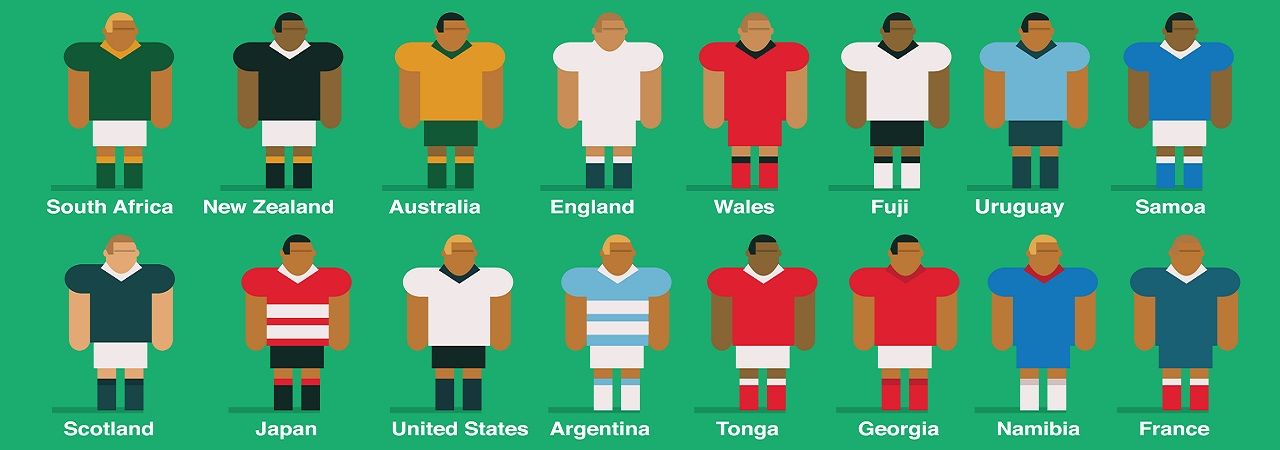An A to Z guide of the Rugby World Cup 2015
21 Aug 2015

Categories: Stag Sports
The Rugby World Cup 2015 is fast upon us, with England due to battle it out against Fiji on September 18th for the opening match. So to help you untangle your tight fives from your 1st XVs, we've put together a handy glossary of common rugby terms...
Psst!
In case you didn't know. We've made our very own 2015 Rugby Stag Do World Cup Package that you and your mates can book!

And that's it for our glossary of rugby terms! We hope you learnt something new and we certainly hope that you share it on Facebook and Twitter. If you're just interested in the stats though and want to use it for a blog post or news piece then you'll be pleased to know that we've included the copy and paste friendly transcript of the infographic below (you're welcome.)
Infographic transcript:
All Blacks
Current world champions and overwhelming favourites to win this year’s World Cup.
Widely regarded as the best team in the world, the ABs combine shrewd, powerful forwards led by the inspiring Richie McCaw, and talented backs renowned for their pace.
Binding
How the two sets of front row players in a scrum hold on to each other. Strict rules dictate how to hold on to an opponent: props often bend the rules to manipulate their opponent's body position, giving them a significant advantage in the push.
Charge down
When a player has tried to clear the ball with a kick, but an opposing player has managed to charge at the ball and block it. Often these are good opportunities to turn over the ball and score a try.
Drop goal
Sensational, nail-biting and often a bolt out the blue, match-winning drop goals define World Cups. South African Jannie de Beer holds the record for the most in one World Cup match, racking up an impressive five against England in 1999.
Ellis, William Webb
Salford-born clergyman William Webb Ellis is generally credited as the inventor of rugby, famously having picked up the ball during a school football match and running at the opposing team’s goal. He gave his name to the trophy presented to the World Cup winners - the William Webb Ellis Cup.
Flanker
The players wearing numbers 6 & 7, also known as wing forwards. Flankers contribute both to the forwards, adding push in the scrum and help lifting in lineouts, while also coming into the backs for crash balls and winning possession at the breakdown.
Grubber
A bouncing ground kick that makes the ball roll irregularly across the pitch, making it very difficult for an opposing player to catch without giving away a knock-on penalty.
Haka
A traditional M?ori dance performed by the All Blacks at the start of games, intended to psyche up the kiwis and intimidate the opposition. There are actually many different hakas, each related to a different Maori tribe. The iconic one performed by the ABs is known as the Te Rauparaha haka.
Inside centre
One of the two central players in the backs, inside centres are often big enough to take crash balls into the opposition, and skilful enough to pass out wide to their wingers. Also key for holding the backs defensive line.
Jumper
The jumper is the player held up in the line out to catch the ball. They’re generally one of the second row players, for the simple reason that second rows are usually tall, and therefore have a better reach.
Knock forward
This is where a player knocks the ball in front of them using their hands and loses possession, rather than passing the ball backwards (or losing possession of the ball backwards). It’s one of the more common penalties you’ll see given away in a rugby match.
Lineout
These are the rugby equivalent of a ‘throw in’ in football. If the opposing team has knocked the ball out of play, your team has the opportunity to throw the ball back onto the pitch for your team to catch.
Maul
Mauls are when a player takes a ball into contact, stays on his feet and tries to drive the opposition back. Other players join the throng, and the player with the ball attempts to feedback out to his scrumhalf, who can then sweep it out along the backs.
No. 8
The big guy at the back of the scrum. Number 8s are one of the key forwards players. They are marauders, getting into the thick of rucks and mauls, and playing a crucial role in defense. They’re big, strong, fit and mobile.
Outside centre
The counterpart to the inside centre, these guys are the last man before the winger. They’re often slightly smaller than inside centres, but faster and with better hands. They’re good runners, with plenty of pace and agility.
Prop
Short and fat. Props are the power engine of the scrum, the hefty bulwark that anchors the team and acts as an ‘immoveable object’. In open play, they are key in rucks and mauls, forming a formidable barrier in defence.
Quick throw-in
If you’re savvy, you can take a quick throw in before a line-out is formed, giving your team an advantage. It’s only legal when the ball hasn’t been touched by any other person apart from the player taking the throw (or the opponent who may have carried the ball into touch).
Ruck
Rucks are like mauls, but instead of the player staying on their feet, they hit the deck. Players from both sides pile over the top, attempting to get possession of the ball. Players taking a ball into a ruck need to place it behind them, to make it easier for their team to recover it.
Springboks
One of the ‘Big Three’ Southern Hemisphere teams, the Springboks are rated second in the world and have won the tournament twice previously. Physically strong, imposing and with a formidable pack, this team are always in with a chance of winning.
Tight five
The ‘tight five’ form the core of the scrum, and consist of the props, hooker and second row. These are the workhorses of the squad. While the backs and loose forwards generally steal the headlines, it’s the tight five who are the team’s engine.
Up and under
Also known as a Garryowen kick (after the Irish rugby club), this is a short punt behind or onto an opposing team. It’s designed to put the opposing team under pressure, by giving your players the time to run up and compete for the ball.
Video referee
Also known as the Television Match Official (TMO), this is the referee who monitors the match via videolink, and can be called upon to make decisions when the officials on the pitch can’t see what’s going on.
Wallabies
Arguably England’s biggest threat in the opening stages, the Wallabies are currently sitting at a deceptively low world ranking of 6th at the moment. Australia have won the cup twice previously however, so they are certainly not to be dismissed lightly.
First XV
The first XV is the first-choice squad for any rugby team. If players are injured or unable to play, they are replaced by the reserves.
Yellow card
These are shown when a player is sent to the ‘sin bin’ for ten minutes for an infringement of the rules.
Zulu warrior
An age old tradition, this is an initiation rite for those who score their first try. It involves taking off your clothes, either after the match or in the clubhouse after a few beers, and running around naked. It ends with you drinking beer from your shoe.

Tom Bourlet
Tom is our SEO expert and Senior Digital Marketer at The Stag Company. He has a huge passion for travelling, playing the saxophone, the gym and completing as many life experiences as possible.
View all posts by Tom BourletOur stag destinations
Stag dos
made easy
Experienced Event Planners
Tried & tested activities
Flexible payment options
Easy online booking
We're the original stag experts
Book a stag and invite friends to pay, all in one place!


.jpg)

